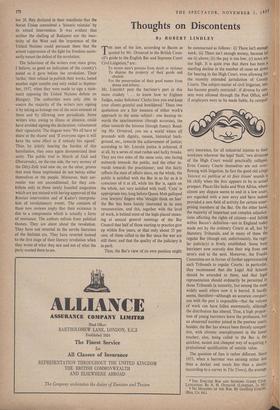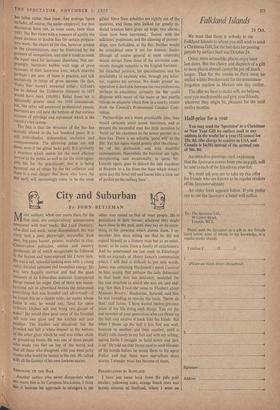Thoughts on Discontents
By ROBERT LINDLEY rr HE uses of the law, according to Bacon as I quoted by Mr. Ormerod in the British Coun- cil's guide to the English Bar and Supreme Court Civil Litigation,* are : To secure men's persons from death or violence To dispose the property of their goods and chattels
For the preservation of their good names from shame and infamy.
Mr. Lincoln[ puts the barrister's part in this more crudely `. . to know how to frighten Judges, make Solicitors' Clerks love you and keep your clients grateful and bewildered.' These two quotations are a fair measure of either work's approach to the same subject : one leaning to- wards the sanctimonious (though accurate), the other towards the fatuous (though funny). Read- ing Mr: Ormerod, you see a world where all proceeds with dignity, reason, historical back- ground, etc., towards the achievement of justice; according to Mr. Lincoln justice is achieved, if at all, by a series of mad rushes and lucky breaks. They are two sides of the same coin, one facing outwards towards the public, and the other in- wards towards the practitioner; and this fairly reflects the state of affairs since, on the whole, the public is satisfied with the Bar in so far as it is conscious of it at all, while the Bar is, again on the whole, not very satisfied with itself. 'Coin' is appropriate too; long before Queen Mab galloped over lawyers' fingers who 'straight think on fees' the Bar has been keenly interested in its own remuneration, and this, together with the level of work, is behind most of the high-placed moan- ing at annual general meetings of the Bar Council that half of those starting to practice give up within five years, or that only about 35 per cent. of those called to the Bar since the war are still there; and that the quality of the judiciary is in peril.
Thus, the Bar's view of its own position might be summarised as follows : (i) There isn't enough work; (ii) There isn't enough money, because (a) see (i) above; (b) the pay is too low; (e) taxes are too high. It is quite true that there has been a startling decline in the number of cases set down for hearing in the High Court, even allowing for the recently extended jurisdiction of County Courts. The subject-matter of civil litigation, too, has become greatly restricted : if divorce by con- sent were allowed through the Post Office, and if employers were to be made liable, by compul- sory insurance, for all industrial injuries to their workmen wherever the legal 'fault,' two divisions of the High Court would practically collapse. Even County Courts themselves are not over- flowing with litigation. In fact the good old adage 'Interest rei publica ut sit finis litium' sounds a bit chilly when the finis appears to be in actual prospect. Places like India and West Africa, where almost any dispute seems to end in a law court, are regarded with a new envy and have indeed provided a new field of activity for certain enter- prising members of the Bar. On the other hand, the majority of important and complex adjudica- tions affecting the rights of citizens—and falling within Bacon's definition—are in England today made not by the ordinary Courts at all, but by Statutory Tribunals, and in many of these the regular Bar (though not, unfortunately, the regu- lar judiciary) is firmly established. Some busy barristers now scarcely don their wig from one term's end to the next. Moreover, the Franks Committee are in favour of further approximating such Tribunals to regular Courts : in particular, they recommend that- .the Legal Aid Scheme should be extended to them, and that legal representation should ordinarily be permitted in those Tribunals (a minority, but among the most widely used) where now it is barred. It hardly seems, therefore—although an accurate compari- son with the past is impossible—that the volume of work can have fallen enormously, although the distribution has altered. True, a high propor- tion of young barristers leave the profession, but an abnormal number joined in the postwar years; besides, the Bar has always been fiercely competi- tive, with chronic unemployment in the lower reaches; also, being called to the Bar is the quickest, easiest and cheapest way of acquiring a professional qualification of outside value.
The question of fees is rather different. Since 1953, when a barrister was earning rather less than a docker and much less than a dentist (according to a survey in The Times), the average * THE ENGLISH BAR AND SUPREME COURT CIVIL LITIGATION. By A. H. Ormerod. (Longman, 2s. 6d.) t No MOANING OF THE BAR. By Geoffrey Lincoln. (Bles, lls. 6d.)
has fallen rather than risen. Any average figure Includes, of course, the under-employed, but fees themselves have not, in some cases, risen since 1883. The Bar views with a measure of apathy the latest decision to double fees for certain prepara- tory work; the object of the rise, however modest in the circumstances, may be frustrated by the pressure of competition, and also it tends to mask the equal need for increases elsewhere. Not sur- prisingly, barristers bubble with rage at press accounts of their luxurious lives, which describe perhaps 1 per cent. of those in practice, and talk exclusively in terms of gross income. (In fact, fancy fees' haven't increased either : Giffard's fee to defend the Tichborne claimant in 1873 Would have been £10,000.) Relief from tax is admittedly greater since the 1956 concessions, but, like other self-employed professional people, barristers are still near the bottom of that curious mixture of privilege and repression which is the country's tax system.
The fact is that the structure of the Bar has scarcely altered in the last hundred years. It is still individualist, independent, exclusive and companionable. The glittering prizes are still there, even if the glitter lacks gold. It is probably a structure which makes for the most efficient service to the public as well as for the most agree- able life for the practitioner; but it is being squeezed out of shape by the tax collector and there is a real danger that those who leave the Bar carry will increasingly come to be the most
gifted. Since State subsidies are rightly out of the question, and those who looked for greatly re- duced taxation have given up hope, two allevia- tions have been canvassed: 'fusion' with the solicitors' profession, and the allowing of partner- ships, now forbidden, at the Bar. Neither would be considered were it not for finance; fusion (though of course general in most countries) would detract from three of the attributes com- monly thought valuable in the English barrister : his detached position, his specialisation, and his availability to anybody who, through any solici- tor, requires his services. No doubt greater co- operation is desirable between the two professions, perhaps in education; certainly the Bar could dispense with many of the more or less puerile rulings on etiquette which flow in a murky stream from the Council's Professional Conduct Com- mittee.
Partnerships are a more practicable idea; they would certainly assist junior barristers, and at present the successful man has little incentive to `build up' his chambers as the senior partner in a firm has. There is no saleable 'good will' at the Bar. Yet this again would greatly alter the charac- ter of the profession, and with doubtful consequences. Meanwhile the barrister sits tight, complaining, and occasionally, to quote Mr. Lincoln again, goes to defend the odd murderer at Bodmin 'at a fee from the State which doesn't quite pay the hotel bill and leaves him a little out of pocket on the railway fare.'

































 Previous page
Previous page